Related Research Articles

Juliette Binoche is a French actress. She has appeared in more than 60 films, particularly in French and English languages, and has been the recipient of numerous accolades, including an Academy Award, a British Academy Film Award and a César Award.
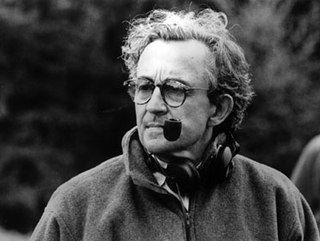
Louis Marie Malle was a French film director, screenwriter, and producer who worked in both French cinema and Hollywood. Described as "eclectic" and "a filmmaker difficult to pin down", Malle made documentaries, romances, period dramas, and thrillers. He often depicted provocative or controversial subject matter.
Marcel Ophuls is a German-French documentary film maker and former actor, best known for his films The Sorrow and the Pity and Hôtel Terminus: The Life and Times of Klaus Barbie.

Arthur Christopher Orme Plummer was a Canadian actor. His career spanned seven decades, gaining him recognition for his performances in film, stage, and television. His accolades included an Academy Award, two Tony Awards, and two Primetime Emmy Awards, making him the only Canadian recipient of the "Triple Crown of Acting". He also received a BAFTA Award, a Golden Globe Award, and Screen Actors Guild Award as well as a nomination for a Grammy Award.

Abbas Kiarostami was an Iranian film director, screenwriter, poet, photographer, and film producer. An active filmmaker from 1970, Kiarostami had been involved in the production of over forty films, including shorts and documentaries. Kiarostami attained critical acclaim for directing the Koker trilogy (1987–1994), Close-Up (1990), The Wind Will Carry Us (1999), and Taste of Cherry (1997), which was awarded the Palme d'Or at the Cannes Film Festival that year. In later works, Certified Copy (2010) and Like Someone in Love (2012), he filmed for the first time outside Iran: in Italy and Japan, respectively. His films Where Is the Friend's Home? (1987), Close-Up, and The Wind Will Carry Us were ranked among the 100 best foreign films in a 2018 critics' poll by BBC Culture. Close-Up was also ranked one of the 50 greatest movies of all time in the famous decennial Sight & Sound poll conducted in 2012.

John David Landis is an American filmmaker and actor. He is best known for directing comedy films such as The Kentucky Fried Movie (1977), National Lampoon's Animal House (1978), The Blues Brothers (1980), An American Werewolf in London (1981), Trading Places (1983), Three Amigos (1986), Coming to America (1988) and Beverly Hills Cop III (1994). He also directed the music videos for Michael Jackson's "Thriller" (1983) and "Black or White" (1991).

The cinema of Iran, or of Persia, refers to the film industry in Iran. In particular, Iranian art films have garnered international recognition. Iranian films are usually written and spoken in the Persian language.

The Red Balloon is a 1956 French fantasy comedy-drama featurette written, produced, and directed by Albert Lamorisse. The thirty-four-minute short, which follows the adventures of a young boy who one day finds a sentient, mute, red balloon, was filmed in the Ménilmontant neighborhood of Paris.

Francis Albert Lai was a French composer, noted for his film scores. He won the 1970 Oscar for Best Music, Original Score and the Golden Globe Award for Best Original Score for the film Love Story. The soundtrack album went to No. 2 in the Billboard album charts and the film's theme, "Where Do I Begin", was a hit single for Andy Williams.
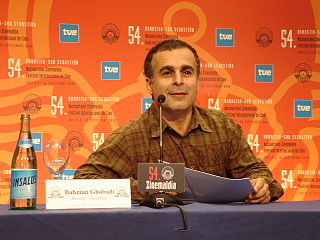
Bahman Ghobadi is an Iranian Kurdish film director, producer and writer. He belongs to the "new wave" of Iranian cinema.
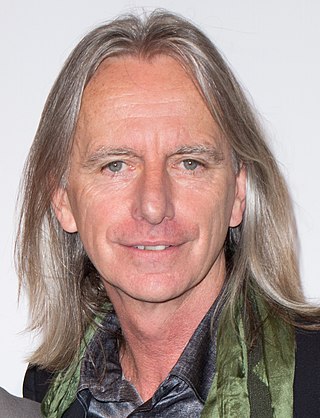
Robert Scott Hicks, known as Scott, is an Australian film director, producer and screenwriter. He is best known as the director of Shine, the biopic of pianist David Helfgott. Hicks was nominated for two Academy Awards. Other movies he has directed include the film adaptations of Stephen King's Hearts in Atlantis and Nicholas Sparks' The Lucky One.

Albert Lamorisse was a French filmmaker, film producer, and writer of short films which he began making in the late 1940s. He also invented the strategic board game Risk in 1957.

Dariush Mehrjui was an Iranian filmmaker and a member of the Iranian Academy of the Arts.
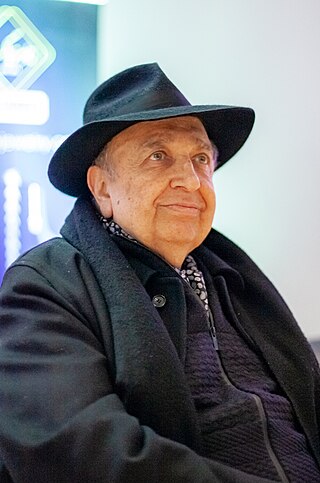
Bahman Farmanara is an Iranian film director, screenwriter, and film producer. He is best known for his films Smell of Camphor, Scent of Jasmine (2000), A House Built on Water (2001), and A Little Kiss (2005). Bahman Farmanara is the second son of a family of four brothers and one sister. The family business was Textile and he was the only son who did not join the company and went off to the United Kingdom and later on to the United States to study acting and directing. He graduated from the University of Southern California with a BA in Cinema in 1966. After returning to Iran and doing military service, he joined the National Iranian Radio and Television.

Ahmad Pejman, also spelled as Ahmad Pezhman, is an Iranian contemporary classical composer who resides in the United States. Pejman is notable for his works in opera, symphonies, and music for film.
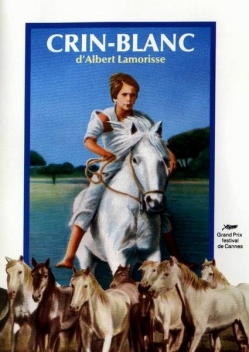
White Mane is a 1953 short film directed by French filmmaker Albert Lamorisse. It is based on a children's book with the same name by the French author René Guillot.
Men Against the Arctic is a 1955 American short documentary film directed by Winston Hibler. It was part of Disney's People & Places series. It won an Oscar at the 28th Academy Awards in 1956 for Documentary Short Subject. It was also entered into the 6th Berlin International Film Festival.
David Bradbury is an Australian film maker who began his career in 1972 as an ABC radio journalist, and has since produced 21 documentary films, including many that tackle difficult political issues and highlight the plight of the disadvantaged. Bradbury has won many international film festival prizes, received five Australian Film Industry awards, and two Academy Award nominations. He graduated from the Australian National University with a degree in political science.
Generation on the Wind is a 1979 documentary film produced by David Vassar and Andrew Finley. The film is a character study centered on a rag tag group of young artists, mechanics and environmental activists who successfully built the largest electrical generating windmill in the world. The documentary required one year of shooting to finish the film. Generation on the Wind aired on PBS. It was then released to educational markets by Churchill Films.
Edmond Séchan was a French cinematographer and film director.
References
- ↑ Terence Rafferty (11 November 2007). "Two Short Fables That Revel in Freedom". New York Times. Retrieved 23 December 2007.
- ↑ "The 51st Academy Awards (1979) Nominees and Winners". oscars.org. Retrieved 6 October 2011.
- ↑ Clarke Fountain (2007). "NY Times: The Lovers' Wind". Movies & TV Dept. The New York Times . Baseline & All Movie Guide. Archived from the original on 4 December 2007. Retrieved 16 November 2008.